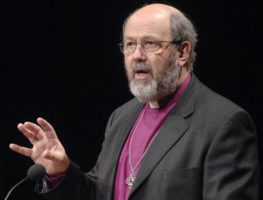Our challenge today in many parts of North America and Europe is not militant atheism but indifferent agnosticism.
The average person may not say “I hate God, and I have ten reasons why!” But you might hear that person say, “I don’t know if there’s a god, but why is it such a big deal? Who cares? Can’t we just love one another? Can’t we just get along?”
In an age when belief is contested, when religion is a private matter with little bearing on real life, the church needs to recover the art of radical hospitality.
What exactly does that mean?
Join People on the Journey
Luke tells two stories at the end of each of his volumes, one at end of his gospel, the other at the end of Acts. In the first story, Jesus finds disappointed and disillusioned disciples on the road to Emmaus, and he ‘joined them on their journey’ (Luke 24:15). He didn’t say “Come to Me” or “Come follow Me.” That was all well and fine the first time. But not now when faith had been shattered and when hopes had been badly broken. When we are too weak, too broken to come to Jesus, he comes to us. He joins us on the journey. When we are too weak, too broken to come to Jesus, he comes to us. He joins us on the journey. Click To Tweet
Radical hospitality is more than making our sacred spaces ready for others; it is a kind of hospitality that we exhibit by showing up in someone else’s space with a posture of openness. How many times do church leaders show up at gatherings that we have not convened? How often do we as Christians want people to come with us to church, while we exit the places where the rest of the community is? We want people to come to us, but are we willing to go to them? Like Jesus coming alongside the disillusioned disciples, we need to walk gently into the spaces where the unchurched and post-Christians have gone.
The second of Luke’s ending stories shows Paul as a prisoner on a Roman slave ship. When a storm arose, a centurion on the ship took charge. Paul tried to speak to him, but the centurion paid more attention to the captain and to the ship’s owner than to a follower of a strange Messiah. This is an apt picture of the church in our age: we’re trying to talk and gain the attention of a sinking world, but our voice is ignored while another—perhaps the voice of power and profits—is preferred. Christians are no longer anywhere near the cultural center.
Nevertheless, Luke’s stories describe Jesus and Paul in nonreligious places, meeting people where they are in the journey, whether they are disillusioned or even ideologically hostile. This is what radical hospitality looks like: entering the places of pain in our communities, listening and learning. This is what radical hospitality looks like: entering the places of pain in our communities, listening and learning. Click To Tweet
Tell a Beautiful Story
But there’s more.
After asking and listening, Jesus began to explain to them from the law and the prophets how it had been prophesied that the Messiah would have to suffer and then be raised up (v. 27). They had been reading the Scriptures wrong. He showed them how the Scriptures spoke of Him.
As for Paul, he kept speaking, but not in an accusing way. He offered little rebuke and a lot of hope. In fact, Paul’s word to them when the heavens had been closed off and they had lost all hope was for them to “take heart” (v. 22, 25).
Radical hospitality is more than listening to someone else’s story; it is telling the more beautiful story of all—the Jesus Story. Like Paul standing up in the middle of a storm to speak to terrified soldiers and sailors and prisoners, we need to go into the heart of the tempest as a way of saying that even there Christ is present. Sometimes it means retelling the story of Scripture in a more beautiful and Christ-centered way, the way Jesus did; sometimes, like Paul, we simply stand up and testify to grace.
Give Thanks for Grace
When they reached Emmaus, Jesus decided to act as if he were continuing on the road, just to see if they were hungry enough to know more.
So he waited.
“Stay with us,” they said. “It’s nearly evening, and the day is almost over” (v. 29). It was hospitality to a stranger that became the game changer.
Jesus accepted their offer. Then Jesus, the guest, started acting like the host. When they sat at the table, Jesus took the bread and began giving thanks. This may not mean much to us, but in Jewish culture, the host always says the blessing. Yet here was this strange stranger talking as if the Scriptures were all about Him and acting as if the table and the meal were his to bless. Jesus “took the bread and blessed and broke it and gave it to them” (v. 30). And then the very next thing Luke tells us is that “their eyes were opened and they recognized him” (v. 31).
Paul, having awakened hope in the middle of a shipwreck, began to bear witness to the grace of God. The climactic moment of this story is when Paul, like Jesus, “took bread, gave thanks to God in front of them all, then broke it and began to eat” (Acts 27:35). Only twice in both his gospel account and in the book of Acts combined does Luke use the Greek word eucharisteo—Passover in Luke 22 and here in Acts 27. In a hostile environment and in the midst of turbulence, Paul acted eucharistically. The bread on that ship was not what we might call “the Eucharist”—the Lord’s Supper. But his taking of bread, giving thanks for it as a way of blessing it, and then breaking it and giving it to the sailors, soldiers, and prisoners on board was eucharistic. It was a way of bearing witness to the grace of God in the middle of a terrible time. It was a way of saying that even here and even now, when you can no longer see heaven, there is a God who is the giver of every good gift. Like the Eucharist, this meal on a shipwreck was a meal of thanksgiving and a meal of hope. And it was an act of radical hospitality.
Blessed, Broken, Given
In both of these final stories of Luke’s volumes, there is bread that is blessed, broken, and given. They are stories that show us how a sacramental imagination can form us to be a people of radical hospitality. When we find the disillusioned disciples walking away with downcast eyes, when we find skeptical unbelievers trying to survive a shipwreck, our calling is to meet them where they are. Click To Tweet
When we find the disillusioned disciples walking away with downcast eyes, when we find skeptical unbelievers trying to survive a shipwreck, our calling is to meet them where they are. Like Jesus acting as host of a meal that was not his, like Paul on a ship that was not under his command, we can find a way to reach out to those in the world and stand in the midst of their questions and pain, their disappointments and fear, and tell a more beautiful story. We can bear witness to the grace of God at work all around them, in the unlikeliest places and the lowest moments.
Jesus was a guest who acted like a host; Paul was a prisoner who acted like a priest. So it can be for us. Wherever we find ourselves, we can take bread, bless it, break it, and give it. Actually, in Jesus’s hands, we ourselves can become blessed, broken, and given for the life of the world. This is what radical hospitality looks like.










Missio Alliance Comment Policy
The Missio Alliance Writing Collectives exist as a ministry of writing to resource theological practitioners for mission. From our Leading Voices to our regular Writing Team and those invited to publish with us as Community Voices, we are creating a space for thoughtful engagement of critical issues and questions facing the North American Church in God’s mission. This sort of thoughtful engagement is something that we seek to engender not only in our publishing, but in conversations that unfold as a result in the comment section of our articles.
Unfortunately, because of the relational distance introduced by online communication, “thoughtful engagement” and “comment sections” seldom go hand in hand. At the same time, censorship of comments by those who disagree with points made by authors, whose anger or limited perspective taints their words, or who simply feel the need to express their own opinion on a topic without any meaningful engagement with the article or comment in question can mask an important window into the true state of Christian discourse. As such, Missio Alliance sets forth the following suggestions for those who wish to engage in conversation around our writing:
1. Seek to understand the author’s intent.
If you disagree with something the an author said, consider framing your response as, “I hear you as saying _________. Am I understanding you correctly? If so, here’s why I disagree. _____________.
2. Seek to make your own voice heard.
We deeply desire and value the voice and perspective of our readers. However you may react to an article we publish or a fellow commenter, we encourage you to set forth that reaction is the most constructive way possible. Use your voice and perspective to move conversation forward rather than shut it down.
3. Share your story.
One of our favorite tenants is that “an enemy is someone whose story we haven’t heard.” Very often disagreements and rants are the result of people talking past rather than to one another. Everyone’s perspective is intimately bound up with their own stories – their contexts and experiences. We encourage you to couch your comments in whatever aspect of your own story might help others understand where you are coming from.
In view of those suggestions for shaping conversation on our site and in an effort to curate a hospitable space of open conversation, Missio Alliance may delete comments and/or ban users who show no regard for constructive engagement, especially those whose comments are easily construed as trolling, threatening, or abusive.